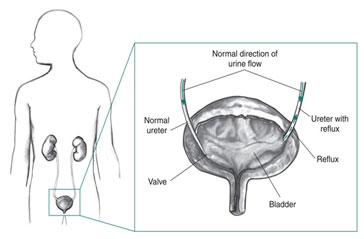Urinary tract infections (UTIs) in children are a common yet frequently overlooked health issue. UTIs can be painful and distressing for your child and, if left untreated, can lead to severe complications. It can be difficult to know when your child has a UTI, especially when they are very young. Knowing the signs can help you identify when they may be suffering from a UTI.
A urinary tract infection occurs when harmful bacteria invade the urinary system, which consists of the kidneys, ureters, bladder, and urethra. While UTIs can affect children of all ages, they are most common in infants and toddlers, particularly those who are not toilet trained. In children, UTIs are more prevalent in girls, mainly due to differences in anatomy.
Symptoms of UTIs in Children
Recognizing the signs and symptoms of a UTI in your child is important for timely treatment. Symptoms may vary depending on your child’s age and the part of the urinary tract affected. Common symptoms include:
- Complaining pain or burning sensation during urination
- Frequent need to urinate, often with little urine output
- Foul-smelling or cloudy urine
- Lower abdominal pain or complaining of a “tummy ache”
- Incontinence or accidents in toilet-trained children
- Fever, chills, and irritability (particularly in younger children)
- Nausea and vomiting
- Fatigue and general malaise
Causes of UTIs in Children
UTIs in children are typically caused by the bacteria Escherichia coli (E. coli), which normally lives in the intestines. Other bacteria, such as Klebsiella and Proteus, may also be responsible. Common causes of UTIs in children include:
- Anatomical abnormalities: Some children are born with structural issues that prevent the proper flow of urine, making them more susceptible to infections.
- Vesicoureteral reflux (VUR): This condition allows urine to flow back into the kidneys from the bladder, increasing the risk of UTIs.
- Poor hygiene: Inadequate or improper wiping after bowel movements, especially in girls, can spread bacteria from the anus to the urethra.
- Constipation: A full rectum can put pressure on the bladder, preventing it from emptying completely and increasing the risk of infection.
- Holding urine: Delaying urination for long periods can cause the bladder to become overfull, creating an environment conducive to bacterial growth.
Diagnosis and Treatment
If you suspect your child has a UTI, it is essential to consult a healthcare professional promptly. A urine sample will typically be collected for analysis and culture to determine the presence and type of bacteria. Based on the results, your doctor will prescribe a course of antibiotics.
Your child needs to complete the prescribed medication, even if their symptoms improve before the treatment is finished.
Additionally, your doctor may recommend additional testing, such as ultrasound or voiding cystourethrogram (VCUG), if your child experiences recurrent UTIs or has an underlying condition that requires further evaluation.
Prevention
Preventing UTIs in children involves promoting good hygiene and healthy urinary habits. Some helpful tips include:
- Encouraging regular bathroom breaks
- Teaching proper wiping technique, especially for girls (front to back)
- Ensuring your child drinks plenty of water to flush out bacteria
- Avoiding bubble baths and harsh soaps that can irritate the genital area
- Dressing your child in breathable cotton underwear to prevent moisture buildup
- Treating constipation promptly, as it can contribute to UTI development
Pediatric Urologists
Your child may need to see a urologist if they have frequent or recurrent UTIs or kidney infections. Some urologists specialize in helping children and have expertise in treating recurrent UTIs or correcting anatomical abnormalities that cause frequent UTIs.
More Information
Frequently Asked Questions
I’ve heard of UTIs in adults, but how did my child get one?
The normal body can protect itself from urinary infections. In some children, a UTI may be a sign of an abnormality. For this reason, when a child is found to have a UTI, more tests and x-rays may be ordered. Many children get UTIs because they don’t use the restroom regularly or don’t drain their bladder all the way. Also, some children who often get UTIs have trouble with bladder control during the day (dysfunctional elimination syndrome). Constipation is also linked to urinary infections, and treating this problem can lower the chance of getting a UTI. Drinking more water and urinating more help the body fight off urinary infections.
Do UTIs have long-term effects?
Young children have the greatest risk for kidney damage from UTIs, especially if they have some unknown urinary tract abnormality. The damage can cause scarring, poor growth, and abnormal kidney function, as well as high blood pressure and other problems. It is important that your child be checked carefully and treated at once.
Questions to Ask Your Health Care Provider
During Diagnosis:
- Do my child’s symptoms sound like a UTI?
- What did the urine sample show?
About Treatment
- What treatment do you suggest?
- Are there any side effects to this treatment I should watch for?
- Is there anything else I can do to help my child feel better?
- How will I know if my child is getting better or worse?
- How soon should my child feel better? Should I call you if my child doesn’t feel better then?
About Preventing Future UTIs
- How much water or other fluids should my child usually drink?
- Can my child still take bubble baths?
- Is there anything else I can do to help prevent my child from getting another UTI?
- Should my child see a pediatric urologist to see if there is anything in his/her urinary tract that is not normal?
- Should my child take antibiotics to prevent future UTIs?


